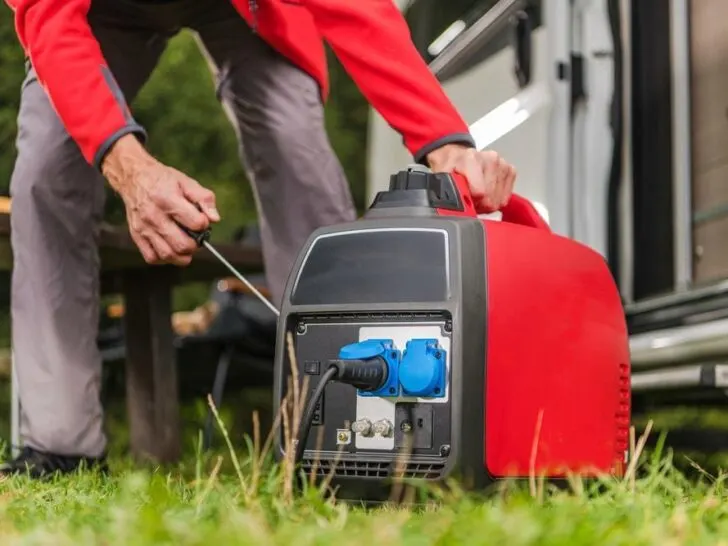The RV ready generator will ensure that you will never face a power outage. Most of the time, campsites have shore power available. You can plug your RV port in the shore power panel, and it will light up your whole vehicle.
What Does RV Ready Generator Mean? An RV ready generator means that your generator has such a system installed inside it that you do not require any adapter to connect the RV with the generator. For example, an RV-ready generator has a TT-30R plug installed on the main panel. The number 30 shows that it is suitable for a 30-amp RV.
When you plan on going camping, you must have the ready generator for the job. It is not easy to choose between different models.
Meaning of RV Ready Generator
You might have heard about the term RV ready generator, but you may not know what it means. When you connect to the shore power, you need 30 amperes of current and 120 volts of voltage.
On the other hand, when you wanted to get the same amount of voltage from it directly, then it is impossible.
Different models are available in the market that supports the power of such vehicle, and they also have the option of a direct plug-in.
RV manufacturers found a way to add all the necessary equipment. As a result, many companies have now built such generators that are already equipped with a TT30R plug.
In case you have a 30-amp RV, you can connect the vehicle with the device directly. You should not be worried if you have a 50-amp RV.
The vehicle needs AC to run its appliances. On the other hand, it provides power in terms of DC.
Engineers and manufacturers also found the solution to this problem. They started making invertible ones. As a result, they have an in-built mechanism that transfers DC to AC.
These vehicles have different types of plugs for 15-amp, 30-amp, and 50-amp. You do not need to buy any extra equipment to connect the RV with it. It saves money and time.
You also need to complete your research before buying it. The user manual will tell you exactly what the manufacturer means about the product. Different companies use this term for other purposes.
Why Do You Need the RV Ready Generator?
You can charge batteries on shore power. You can even run heavy appliances on shore-power, but the problem arises when you do not have a power source to run different electrical equipment.
Similarly, many campsites do not have the luxury of shore power. Therefore, you have to pay for the electricity and the land when you park in such camps.
On the other hand, boondocking is the place for you to avoid such charges and want an authentic camping experience.
Instead, they rely on solar panels and generators for their energy needs while maintaining freshwater by collecting it from showers and sinks.
You need it if you are a boondocking fan. Without them, you cannot have the luxury of an air conditioner and other such appliances.
Some boondocking spots are legal and free, but most require a permit or have restrictions on the number of days you can camp there.
Sometimes the weather gets cold, and the electricity goes out.
What Size RV Generator Do You Require?
Most people think of generators as being big, noisy machines that run on gas or propane. Sometimes it is true, but there are other options.
If you only need electricity for a few hours at night, then a smaller one could be perfect. They are more affordable than larger ones and can come in handy. Many people use these generators overnight.
Generally speaking, devices with power ranging from 2700 watts to 4100 watts and 1800 watts to 3400 watts can easily run class C type RVs and class B type RVs with an air conditioner.
For a class A type RV, you need to buy a generator whose power ranges between 5800 watts to 8300 watts.
You need to know how much power is required to run your motorhome. Similarly, you should know what type of batteries are installed in your vehicle.
It is an essential factor because sometimes you buy small-sized generators that only support up to 4500 watts, but it requires power to run the appliances is 5500 watts.
It becomes difficult to run all the appliances. However, you can calculate the total power of an RV easily. For example, in the case of a 15-amp RV, you can multiply the amperes with the voltage available.
For example, if the ampere is 15 and the voltage is 120, it will require 1800 watts of power. Therefore, you need to buy a 2000 watts generator that can easily support all the appliances.
Can a Portable Generator Run the RV?
Yes, a portable generator is capable of running an RV only if it can run high-power appliances.
You can run two to three appliances at a time. If you want to run the oven and fridge on it, you can use the oven first.
After that, you can run the fridge to freeze the food. Once the food is frozen, you can turn off the fridge and start using the air conditioner.
Place it 7 to 11 feet away from the vehicle and everything will work smoothly.
There is one problem: it will run the air conditioner only for a few minutes, and then it will turn off.
It is because the air conditioner has two parts, its fan and the compressor. Both of them use electricity for their proper working.
The compressor requires much more power than the air conditioner fan as it takes the hot air and gives out cold air. To solve this problem, you can use two normal-sized portable generators together.
In this way, you will get double power and can quickly run an air conditioner. However, it has some disadvantages as well.
Many of them are not built for parallel combinations. So you have to search and find this type specifically.
Similarly, this method is much expensive, and you do not want to waste your money. You will also need to buy more fuel for both of these.
They will produce noise so loud that you will get irritated and have to shut them down. They will also increase the weight, and it will become difficult for you to carry them around.
Many RV owners adopt this method. However, aspects like fuel type, power capacity, portability, and durability need to be considered before making your purchase.
Difference Between Portable and Built-in RV Generators?
Portable ones are those that can be moved from one place to another easily. These devices are generally used during emergencies such as power outages or for outdoor purposes like camping and tailgating.
Compared with other energy sources such as solar and wind power, portable generators have a lot of advantages. For example, they provide a consistent and uninterrupted power supply.
On the other hand, built-in generators are installed inside an RV. Therefore, they do not have a separate fuel tank, unlike portable ones with their fuel tank.
In case it runs out of fuel, you can easily refill it. You do not need to go to any petrol pump to fill it. All of its wires are already connected inside with its ports.
You need to press one button, and it will start supplying power. Unlike portable ones, you do not need to carry them with your hands.
These built-in ones have more power than portable ones. Therefore, they can easily run the air conditioner for a long time without any difficulty.
It is also capable of adjusting its performance following the altitude.
What If the Generator is Not RV Ready?
Sometimes, RV-ready generators can get out of stock, or they may not be available in your area.
There are a few adapters available in the market that you can use to connect a vehicle with it. The most common adapter is TT-30R.
People all over the world use it. One of its ends has three prongs. The other end has three holes.
One of the flat pins is neutral, while the other one is hot. These flat pins are placed at a specific angle. You need to connect it with these adapters.
You need to buy the best quality adapters because a heavy amount of current will pass through them. You must not waste your money on cheap and bad adapters.
Preventative Measures While Operating the RV Generator
They are helpful in times of emergency, but people do not realize that they also cause a lot of potential harm.
We should follow some precautions to not cause any damage or injury to ourselves or others around us.
The first precaution is to check its fuel supply regularly if you plan to run it continuously for more than two days. It will help you to save money and also prevent fire accidents due to the overloading of fuel.
A necessary precaution to take is to use it with proper ventilation and gas masks if there is any risk of CO poisoning.
Carbon monoxide is not easy to detect, and it can kill you before you even know it is there.
You can tell when dangerous levels of CO are present in the air by using a CO detector or looking for symptoms like dizziness, nausea, headaches, weakness, and shortness of breath.
These often have loud noises that can lead to hearing loss if exposed for too long. To avoid this, wear ear protection all the time when you are around your vehicle. You can also use these tips to make the RV generator quiet.
You should be extremely cautious when handling it. These save the day when the power goes out and prevent you from being completely stranded when it happens.
You can get electrocuted or cause an explosion if you do not know what you are doing. At the same time, these are capable of causing significant damage to your property if not used properly.
You need to first turn it on before connecting the appliances. If you start it after connecting the devices, it will put a heavy load on it and stop working.
Related Articles:
How do I bypass RV transfer switch?
When should I change the oil in my RV generator?

